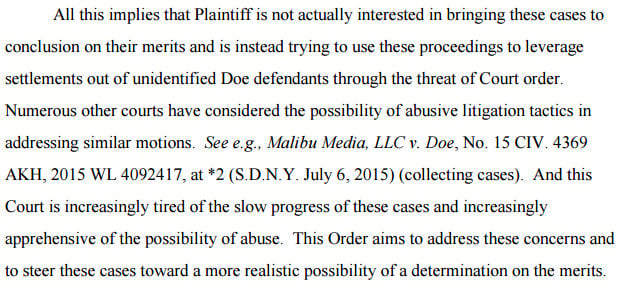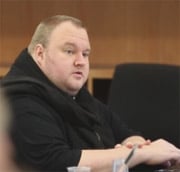
Eventually even local law enforcement agencies may have to get a warrant before they can use stingray spying devices.
The post New Bill Would Force Cops to Get Stingray Warrants appeared first on WIRED.
Unrelated to the whiskey.

Eventually even local law enforcement agencies may have to get a warrant before they can use stingray spying devices.
The post New Bill Would Force Cops to Get Stingray Warrants appeared first on WIRED.

Activision Blizzard’s acquisition of King isn’t about Candy Crush or Bubble Witch, it’s about swallowing up a mobile audience.
The post Activision Buys Candy Crush Maker for $5.9 Billion appeared first on WIRED.
 The makers of Dallas Buyers Club have sued thousands of BitTorrent users over the past two years.
The makers of Dallas Buyers Club have sued thousands of BitTorrent users over the past two years.
Many of these cases end up being settled for an undisclosed amount. This usually happens after the filmmakers obtain the identity of the Internet account holder believed to have pirated the movie.
Not all alleged downloaders are eager to pay up though. In fact, many don’t respond to the settlement letters they receive or claim that someone else must have downloaded the film using their connection.
This presents a problem for the filmmakers, who need to gather additional evidence to prove guilt. In several recent cases they even went through social media profiles of defendants and Google map images of their neighborhoods, for example.
In addition to this info Dallas Buyers Club want to speak to the accused directly so have asked the court to grant dozens of depositions. This would help to determine who the true pirates are, they argue.
The request covers five active cases with 61 IP-addresses which have yet to respond or settle.
The court carefully reviewed the request and in an order late last week U.S. District Court Judge Richard Jones denied the depositions.
In his order (pdf) the Judge writes that depositions are meant to “discover relevant information” but he doubts that Dallas Buyers Club intends to take any of these cases to trial.
When the filmmakers were allowed to depose people in a previous case it didn’t result in the naming of any defendants.
“All this implies that Plaintiff is not actually interested in bringing these cases to conclusion on their merits and is instead trying to use these proceedings to leverage settlements out of unidentified Doe defendants through the threat of Court order.”

Instead, the depositions may be used as a pressure tool, which would be a clear sign of abuse.
“Numerous other courts have considered the possibility of abusive litigation tactics in addressing similar motions. And this Court is increasingly tired of the slow progress of these cases and increasingly apprehensive of the possibility of abuse,” Judge Jones adds.
The Judge admits that depositions may often be helpful, but notes that Dallas Buyers Club wouldn’t be in any better position if the defendant denies being the primary infringer during the deposition.
The filmmakers already have the name and address of the account holders, and should make their case based on this information, the order concludes.
While there’s no direct accusation the mention of possible abuse and the growing impatience with the many Doe lawsuits is a clear blow for the movie studio.
For their part the accused pirates can chalk up a win as they have been saved from having to go through an ‘interrogation’, a potentially threatening and intimidating process.
Source: TorrentFreak, for the latest info on copyright, file-sharing, torrent sites and ANONYMOUS VPN services.
Source: TorrentFreak
 Following an investigation carried out by the BPI and IFPI, with assistance from the US Department of Homeland Security, in 2011 file-sharing links forum Dancing Jesus was taken offline.
Following an investigation carried out by the BPI and IFPI, with assistance from the US Department of Homeland Security, in 2011 file-sharing links forum Dancing Jesus was taken offline.
Two men, one the owner of the site and the other one of the forum’s top uploaders, were arrested by City of London Police. Homeland Security seized a Dancing Jesus server hosted in the United States.
After years of quiet, last October it became evident that the BPI was pursuing a private prosecution against the pair. In January 2014, site owner Kane Robinson of South Shields pleaded guilty to illegally distributing music. Key uploader Richard Graham of Leicestershire entered a guilty plea at a later date.
On November 10, 2014, Robinson and Graham were sentenced and received the harshest punishments ever handed down to UK-based file-sharers. For his part in offering a reported 22,500 links to 250,000 titles, Robinson was sentenced to 32 months. Graham received 21 months.
At the time the sentences were criticized as being both harsh and disproportionate but within months positive signs began to emerge.
In August a posting to a Facebook campaign page titled ‘Justice for Kane Robinson’ carried an optimistic message.
“We saw Kane at the weekend he is doing well and it is hopeful he could be out soon..thanks for all your continued support guys!” it read.
Then last Thursday, after receiving the toughest sentence of its kind and serving time in three separate prisons, Robinson was freed ‘just’ 11 months into his sentence.
His Facebook campaign carried two simple hashtags: #Justice4Kane and #Missioncomplete
It’s unclear why Robinson has been released so early. Chronicle Live said it had approached the Ministry of Justice but the office declined to comment on individual cases. Robinson himself has also remained silent.
TorrentFreak caught up with David Cook, a specialist cyber crime solicitor who was previously instructed to provide expert opinion to the defense in the case. He told TF that he no longer represents Robinson or Graham but confirmed both had previously filed appeals.
“However, this probably has a more simple explanation,” Cook explained.
“A 34 month sentence would equate to 17 months in custody and 17 months ‘on license’ in the community. If a person behaves and is deemed suitable then they may be released earlier.”
Both men will now be looking to rebuild their lives, probably far away from the file-sharing arena.
Source: TorrentFreak, for the latest info on copyright, file-sharing, torrent sites and ANONYMOUS VPN services.
Source: TorrentFreak
 The extradition hearing of Kim Dotcom and former colleagues Mathias Ortmann, Finn Batato and Bram van der Kolk, continued in the Auckland District Court today.
The extradition hearing of Kim Dotcom and former colleagues Mathias Ortmann, Finn Batato and Bram van der Kolk, continued in the Auckland District Court today.
The quartet is fighting deportation to the United States on serious charges including conspiring to commit copyright infringement, conspiring to commit money laundering, and engaging in a racketeering conspiracy.
However, the court heard from the defense that the offenses don’t meet the criteria for the men to be sent to the United States.
Dotcom’s lawyer Ron Mansfield said the Crown, arguing on behalf of the United States, has been attempting to characterize the charges against the men as fraud, an extraditable offense.
However, he pointed out that the US Supreme Court previously ruled that copyright infringement can not be considered fraud. A key case, Dowling v. United States, is referenced in a white paper published by Kim Dotcom (pdf).
It’s important for Dotcom to make a clear distinction between copyright infringement and fraud. Mansfield says that all of the 13 charges against the Megaupload founder are underpinned by copyright infringement allegations.
Also muddying the waters is the fact under United States law one of the criminal copyright infringement charges brought against Dotcom has already exceeded its time limitations. The others, Mansfield said, are not aimed at his client and are dependent on other charges being proven.
“Categorically there is no case to answer under US law,” he said.
“Unless the United States can show an offense of criminal secondary copyright infringement in the United States as a matter of law, this court must reject this application for surrender.”
But locally there are issues too. Mansfield told the court that New Zealand legislation does not recognize copyright infringement as fraud either and the extradition treaty between the two countries does not hold copyright infringement as being an extraditable offense.
“That’s the end of the story, really,” he told Judge Nevin Dawson.
Further boosting Dotcom’s position, Mansfield argued yesterday that even charges of (non-extraditable) copyright infringement are excessive.
As the operator of a service provider company, Dotcom and his colleagues should’ve enjoyed ‘safe harbor’ and not been held liable for the infringing acts of their users.
Dotcom’s defense is expected to conclude this week but no matter what the outcome, it’s unlikely to be the end of the extradition legal process. Whichever side loses, both are expected to take their case to appeal.
Source: TorrentFreak, for the latest info on copyright, file-sharing, torrent sites and ANONYMOUS VPN services.
Source: TorrentFreak

Natasha Jen designed an extendable typeface that can be stretched horizontally like a rubber band.
The post This Awesome Typeface Stretches Like a Rubber Band appeared first on WIRED.

A little girl’s dream RV—with Kevlar reinforced tires, telescopic masts, and a popup penthouse—is headed to Las Vegas for its debut.
The post A 51,000-Pound RV Made for a Little Girl Is Coming to Vegas appeared first on WIRED.

Deep breaths, everyone.
The post No, Snapchat Isn’t Going to Use Your Private Pictures appeared first on WIRED.

The podcast’s second season will be available on the audio streaming service in addition to iTunes.
The post Serial’s Latest Mystery Is Its Move to Pandora appeared first on WIRED.

In a perfect blend of science and art, the NASA’s archives still provoke wonder and awe.
The post Explore the Beauty of Space With the NASA Photo Archives appeared first on WIRED.